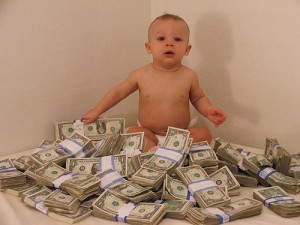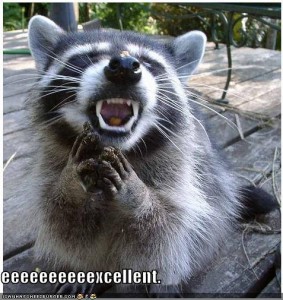I agree with Christopher on his Diddy half-defense–which centered on the hypocrisy of people who tsk-tsk him for buying the wrong kind of ridiculous gift for his children–but I’ll raise him a tick higher.
The Nightline interview that Martin Bashir did with Diddy wasn’t quite the preening sermon that Bashir ran with Michael Jackson (think what you will about MJ, that interview was horrid journalism, edited down until it was nothing but half-truth and innuendo). This Diddy piece was just a very stupid interview. For a sense of how well Bashir understood his subject, just know that he referred to Diddy as a “hard-core gangster rapper” (also telling: Diddy didn’t correct him).
But it was Bashir’s snide moralism about fatherhood that stands out the most. You can tell where Bashir is headed with this from his intro, when he says that Diddy “has enjoyed… the joys of fatherhood, no less than six times.”
When Diddy gets to defending his role as a parent, about six minutes into the interview, Bashir snaps back, “But you don’t live with them.” To which Diddy exercises his prerogative to shut that line of questioning down: “The way I raise my children, I don’t have to explain to you or anybody else.”
True enough. And it’s probably a good thing he doesn’t try to explain what it means to have a lot of children by a different mothers. To (badly) paraphrase Omar Little, Diddy is not a man for this question. He wouldn’t have the words, not enough to speak for an entire caste of non-traditional (and heavily judged) fathers.
Thankfully, the one person I know who can explain a similar brand of fatherhood has already done so, in a 2008 memoir called The Beautiful Struggle. It’s Ta-Nehisi Coates’ story of growing up in Baltimore, the sixth child of a man who had seven children by four mothers. And at the risk of giving a hamfisted synopsis, let me just say that the twist is that Ta-Nehisi gets everything he needs, and more, from his father. Ta-Nehisi is a friend of mine. We worked together. I know the end product. And I don’t think that his father, Paul Coates–former Black Panther, founder of Black Classic Press, endlessly inventive and passionate father–should be made to suffer comparison to Diddy, whom I see as not much more than a clever marketing professional. But Bashir should read Ta-Nehisi’s life story before he goes takes the pulpit again about parenting matters. Here’s an early invocation of Ta-Nehisi’s family, from the book:
My father has seven kids born to four women. Some of us were born to best friends. Some of us were born in the same year. My eldest come first in chronology: Kelly, Chris, William, Junior, all born of my father’s first marriage to Linda. John was born to Patsy, Maleek born to Saligh, to then me and Menile born to my mother, Cheryl. This is all a mess on paper, but it was love to me and formed my earliest and still enduring definition of family.
And from a radio interview in Baltimore (where Ta-Nehisi grew up), his father makes a pretty good summation of the trick of raising sons. He’s talking about raising black sons, but I see truth in this for the rest of us as well:
I always saw it as my job to get them through. And to get them through to me meant–particularly for the boys–it meant getting them through what I feel to be some of the most critical and the roughest areas for black boys; and that’s particularly for those dangerous years between 12 and 18, when so many of our youth go over the side and don’t come back. So for me–it was a matter of steering and navigating them through that time period. Everything before 12 was preparation for 12, you see? And everything in between that was preparation for after 18.
I am not saying that a Maybach is or is not preparing young Diddy Jr for anything good after 18. I’m saying that these statistical outlines–six children, different mothers, different homes–tell us nothing about what kind of father Diddy is. The fact that he admits to his faults as a father, to wanting to be more present in his children lives, is a good sign. We all fall short, usually on that very count. And remember that admitting fault is not part of Diddy’s marketing plan, so it seems a pretty sincere admission.
But what I’m really saying: buy Ta-Nehisi’s book. Ask for it for Father’s Day if you need an excuse. There’s more truth in the first page than in all of Martin Bashir’s squishy clips put together.

 I just caught up
I just caught up 